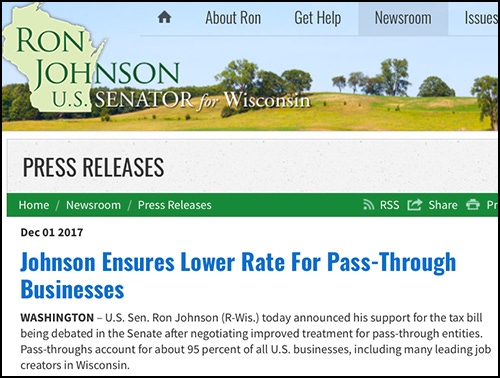A Millionaire Senate Republican Cited the Deficit To Block Aid — After Enriching Himself With Tax Cuts
Republican Sen. Ron Johnson led the fight to give himself a tax cut of up to $205,000. Now he is citing budget concerns to block emergency $1,200 checks as America faces mass starvation.

Senator Ron Johnson of Wisconsin speaking at the 2016 Conservative Political Action Conference (CPAC) in National Harbor, Maryland. (Gage Skidmore / Flickr)
Republican Sen. Ron Johnson on Friday moved to block emergency survival checks to millions of Americans, citing concerns about the federal deficit. Johnson’s move not only follows his vote for a massive $500 billion corporate slush fund — it also follows his successful effort to enrich himself with a giant tax cut that expanded the deficit.
Johnson, who is worth an estimated $39 million, led the fight in 2017 to create special tax breaks for so-called pass-through businesses, or real estate shell companies. Johnson was one of several Republican senators who backed the last-minute provisions inserted in the bill — and who listed income from those pass-through entities on their federal financial disclosure forms.
Based on those federal filings, Johnson stood to personally reap up to $205,000 from the tax cut provisions he championed.
Financial disclosure records reviewed by the Daily Poster show Johnson and his wife own a limited liability corporation, which is the kind of pass-through entities that were targeted for tax cuts by Johnson’s 2017 legislation. Their LLC owns an industrial building in Oshkosh, Wisconsin that is worth between $5 million and $25 million and generated as much as $1 million in income last year.
In all, the tax legislation Johnson backed is projected to increase the deficit by $1.9 trillion over ten years, according to estimates from the Congressional Budget Office.
On Friday, Johnson moved to block a bipartisan proposal, from Vermont Independent Sen. Bernie Sanders and Sen. Josh Hawley (R-MO), to give Americans emergency $1,200 checks, amid a sudden increase in poverty and mass starvation across the country.
Johnson argued that the direct payment proposal would be “mortgaging our children’s future” — an argument that he did not make when he led the fight to personally enrich himself with a massive tax cut only three years ago.
